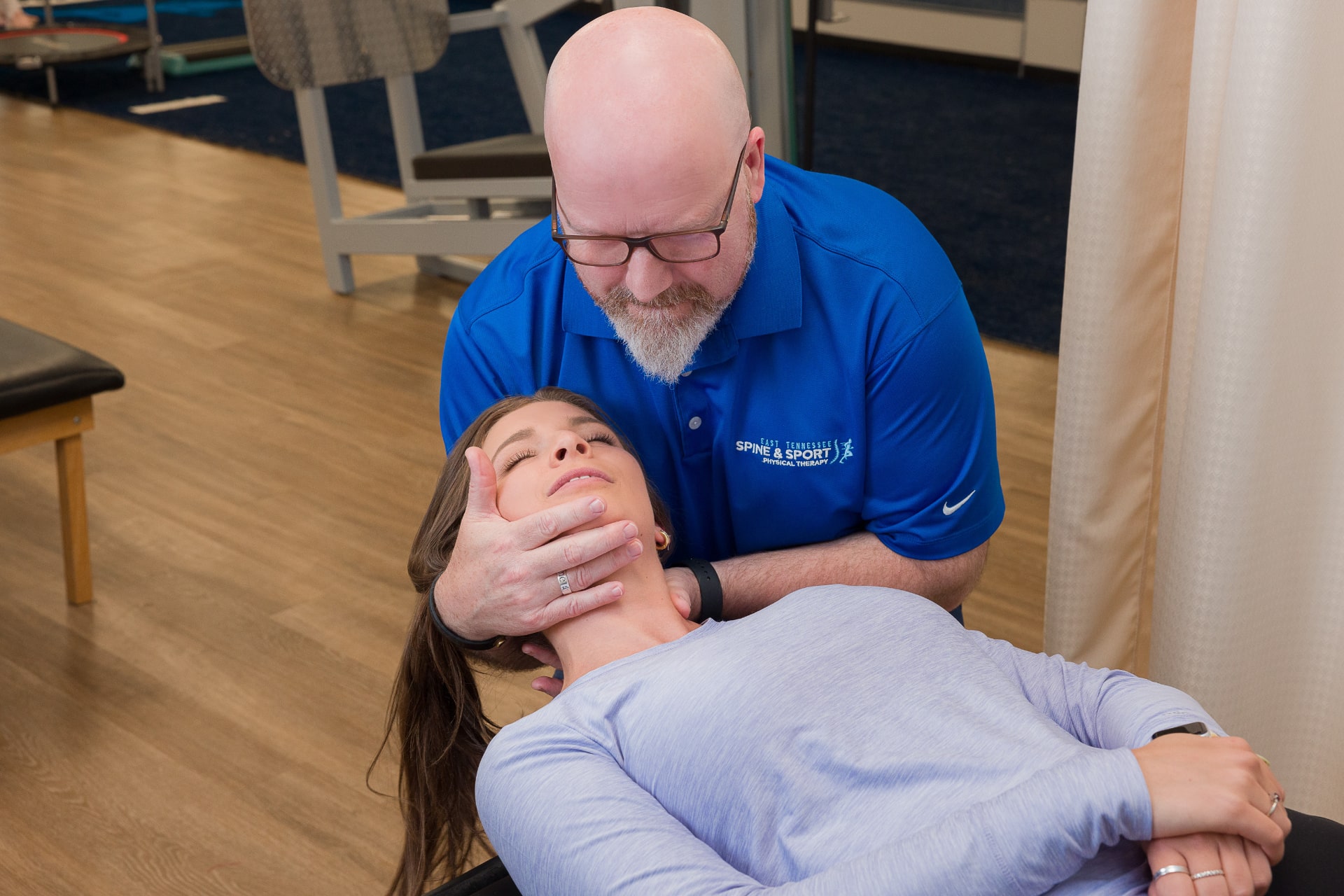East Tennessee Spine & Sport is your go-to provider for
Certified McKenzie Therapists in Lenoir City, TN.
East Tennessee Spine & Sport offers more Certified McKenzie Therapists than any other therapy provider in East Tennessee. All six East Tennessee Spine & Sport clinics have a Certified McKenzie Therapist available.
The McKenzie Method® of Mechanical Diagnosis and Therapy® (MDT) is an internationally acclaimed method of assessment and treatment for spinal and extremity pain developed by New Zealand Physiotherapist Robin McKenzie. It doesn’t just rely on treating the symptoms that patients feel but instead gets to the root cause and addresses the source.
Robin McKenzie released his first book in 1981, starting to train physical therapists throughout the world in this method. This approach to therapy doesn’t rely on the traditional moist heat, ultrasound, and/or electrical stimulation approach. Instead, the McKenzie Method uses specific movements in a repetitive way to identify the direction of movement that the patients prefer/need to reduce symptoms. We call this movement the “directional preference (DP)” and is a key point to the successful treatment using this method.
When you take your tire into the shop because it’s flat, they don’t just fill it back up with air! (or they shouldn’t) They look for the reason why the air is gone in the first place. They then do something to fix that issue before filling the tire back up with air.
Mechanical diagnosis and therapy first identifies what tissue is causing the pain radiating into the leg – perhaps a disc placing pressure on a nerve root- then finds a movement that reduces that pressure on that nerve. As a result, the pain in the leg will reduces, allowing the therapist to introduce back and leg strengthening exercises to ensure less risk for re-injury.
Research on the McKenzie method clearly supports its use as an effective conservative approach to the treatment of spinal and extremities problems prior to more invasive treatments, such as injections and surgery. When compared with just strengthening alone, patients improve earlier in their rehab. When compared to non-specific exercises alone (not using the patient’s directional preference), the outcomes with the McKenzie approach are significantly better in pain reduction and return to normal activities.
By asking a series of specific and in-depth questions, the therapist is able to learn much more about the factors that is causing the problem, and is able to begin to identify potential solutions. Through spending the time sitting with and interviewing, and truly listening to the patient’s answers, particular patterns begin to appear that help the therapist know the extent of testing that needs to be performed.
Next through a series of standard musculoskeletal tests and also the addition of specific repeated movement testing procedures the patient’s preference to movement (called the directional preference) is identified and then turned immediately into a dosed specific exercise program for home.
This specific exercise direction is then supplemented with hands-on manual therapy techniques to achieve full reduction in pain and restoration in movement.
With the McKenzie method, therapy will be split into three phases. The first phase is controlling the pain and identifying the specific exercises that need to be performed. Then. the addition of strength or reactivating exercises to ensure that muscles maintain this pain reduction begins. The final phase is ensuring that the patient is returning back to their normal functional activities without pain or limitation.
This is expected to be achieved in 6 to 12 visits. The ultimate aim is to create a program for the patient to continue with independently in order to maintain the improvements and not require continued care from the practitioner for this episode.
For more information about the McKenzie method visit McKenzieInstituteUSA.org or contact one of our offices to speak directly with the therapist or to schedule a free screening to see if this approach may help you or indeed to schedule a full evaluation and begin treatment. In the state of Tennessee, you do not need a physician’s referral to begin a course of therapy, so please contact us directly to ensure coverage from your insurance.
"*" indicates required fields

Learn about our other services we offer.
Patient Testimonials
I have used East Tennessee Spine and Sport for their MedX program and other matters such as post knee surgery, a shoulder injury, and other senior arthritic matters, since 2005. I am so grateful to have ETSS as a regular part of my health program.Ann Rust MedX Treatment
Spine and Sport's training method has shown steady results and given me the confidence so that I can return to a high level of competition. Their knowledge and expertise of back injury rehabilitation is unrivaled in the Knoxville area.Fred Smith Discectomy at L5-S1
Spine and Sport is the ultimate place for therapy. Every single therapist is highly knowledgeable and more than caring. They brought me back from my ACL tear in five months without post-op pain. Actually, I’m stronger than I was before my injury.Eleni Georgiafandis ACL Injury
Thanks to the folks who work at East Tennessee Spine and Sport, I was able to avoid surgical intervention using their program. Through their knowledgeable staff, I learned how to get well and and how to maintain the level of wellness I achieved in their clinic.Greg Peck Motorcycle Injury
In addition to my personal experience, I’ve referred my wife and several friends to ETSS. They have invariably been pleased with their results. These are good people who know their business. If your problem can be cured by physical therapy, they’ll cure you.Frank Koon Ruptured Disk
Greg DeFilippo, fellow therapists, and employees are the best! Not only are they kind and friendly, but you receive the most comprehensive care in a comfortable atmosphere. In all my experience with therapy, their expertise is unequaled!Sharon Bowles Therapy Treatment
Visit any of our 6 clinics and

